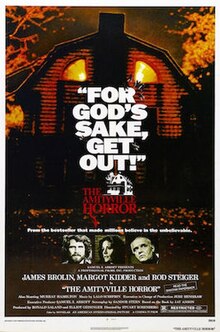
Back Ужасът в Амитивил (филм, 1979) Bulgarian Terror a Amityville Catalan Amityville Horror German The Amityville Horror (película de 1979) Spanish The Amityville Horror (1979ko filma) Basque وحشت در آمیتیویل (فیلم ۱۹۷۹) Persian Luojan tähden, paetkaa! Finnish Amityville : La Maison du diable French Amityville Horror (film 1979) Italian 悪魔の棲む家 Japanese
| The Amityville Horror | |
|---|---|
 Theatrical release poster | |
| Directed by | Stuart Rosenberg |
| Screenplay by | Sandor Stern |
| Based on | The Amityville Horror by Jay Anson |
| Produced by |
|
| Starring | |
| Cinematography | Fred J. Koenekamp |
| Edited by | Robert Brown Jr. |
| Music by | Lalo Schifrin |
Production companies |
|
| Distributed by | American International Pictures |
Release dates |
|
Running time | 118 minutes[3] |
| Country | United States |
| Language | English |
| Budget | $4.7 million[4][5] |
| Box office | $86.4 million[6] |
The Amityville Horror is a 1979 American supernatural horror film directed by Stuart Rosenberg, and starring James Brolin, Margot Kidder, and Rod Steiger. The film follows a young couple who purchase a home haunted by combative supernatural forces. It is based on Jay Anson's 1977 book of the same name, which documented the alleged paranormal experiences of the Lutz family who briefly resided in the Amityville, New York home where Ronald DeFeo Jr. committed the mass murder of his family in 1974. It is the first entry in the long-running Amityville Horror film series, and was remade in 2005.
Executive producer Samuel Z. Arkoff originated the project after purchasing the right's to Anson's book, and it was initially conceived as a television film, which Anson adapted himself. When Arkoff rejected the teleplay, it was reworked by screenwriter Sandor Stern as a feature film. The producers intended to shoot the film in the actual DeFeo residence, but its owners denied them permission. Filming instead began on location in Toms River, New Jersey in October 1978, followed by interior shoots occurring at the Metro-Goldwyn-Mayer sound stages in Los Angeles, which were completed just before the Christmas holiday.
The Amityville Horror had its world premiere at the Museum of Modern Art on July 24, 1979, before receiving a wide theatrical release three days later. The film was a major commercial success and one of the most profitable films released by its distributor, American International Pictures. It went on to gross over $80 million in North America, becoming one of the highest-grossing independent films of all time,[7][8] as well as one of the highest-grossing horror films in cinema history.[9] Though met with largely unfavorable critical reviews at the time of its release, composer Lalo Schifrin's musical score earned the film Golden Globe and Academy Award nominations, while Kidder received a Saturn Award nomination for Best Actress.
Some contemporary film scholars have considered the film a classic of the horror genre,[a] and it is widely regarded as a seminal entry in the sub-genre of the contemporary haunted house film.[10] In his 1981 non-fiction book, Danse Macabre, horror author Stephen King interprets the film as a parable on the anxieties of homeownership and financial ruin, citing the economic crisis of the 1970s and the film's frequent references to financial matters, a reading which has been similarly assessed by other film scholars.
- ^ Cite error: The named reference
mfbwas invoked but never defined (see the help page). - ^ "The Amityville Horror". AFI Catalog of Feature Films. American Film Institute. Retrieved October 31, 2019.
- ^ "THE AMITYVILLE HORROR (X)". British Board of Film Classification. August 16, 1979. Archived from the original on March 18, 2014.
- ^ Arkoff & Turbo 1992, p. 228.
- ^ Smith 2009, p. 13.
- ^ "The Amityville Horror (1979)". Box Office Mojo. Retrieved March 18, 2014.
- ^ a b Broderick 2012, p. 17.
- ^ Cite error: The named reference
millerwas invoked but never defined (see the help page). - ^ Cite error: The named reference
forbeswas invoked but never defined (see the help page). - ^ Mirzoeff 2012, pp. 53–55.
Cite error: There are <ref group=lower-alpha> tags or {{efn}} templates on this page, but the references will not show without a {{reflist|group=lower-alpha}} template or {{notelist}} template (see the help page).
© MMXXIII Rich X Search. We shall prevail. All rights reserved. Rich X Search